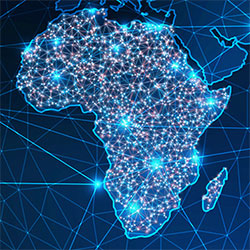NIH launches $58M Harnessing Data Science for Health Discovery and Innovation in Africa program
July / August 2020 | Volume 19, Number 4
The NIH has unveiled a $58 million initiative to advance data science, catalyze innovation and spur health discoveries across Africa. The new program,
Harnessing Data Science for Health Discovery and Innovation in Africa (DS-I Africa), will leverage data and technologies to develop solutions for the continent’s most pressing clinical and public health problems.

Image by iStock
“Data science drives scientific discovery and data sets are the currency of the future,” said NIH Director Dr. Francis S. Collins. “Many years of investment in research infrastructure by NIH and other organizations in Africa have produced an opportunity for substantial technical innovation. By forming a robust network of public and private partners, we believe this initiative can transform the field and pay huge dividends - such as deploying low-cost technologies to improve health care in remote areas, and developing skilled scientists who can mine vast data collections to make discoveries that improve health for us all.”
In four funding announcements, NIH is calling for applications to establish an open data science platform and coordinating center; research hubs; research training programs; and ethical, legal and social implications (ELSI) research. The open data science platform will develop and maintain a data-sharing gateway for existing resources and new data generated by the DS-I Africa research hubs. The coordinating center will provide the organizational framework for the direction and management of the initiative’s common activities. The research hubs are intended to become recognized centers of excellence in data science fields and will advance population-relevant, affordable, acceptable and scalable data science solutions that will improve health in Africa. Research training programs will include a strong foundation in rigorous research design, methods and analytic techniques, provide interdisciplinary research experience and enhance trainees’ ability to develop novel data science solutions. Finally, the program will support research into key ELSI issues such as data privacy and ownership, cybersecurity and sensitivities concerning the use of geospatial information for research or public health surveillance.
We believe this initiative can transform the field and pay huge dividends—such as deploying low-cost technologies to improve health care in remote areas, and developing skilled scientists who can mine vast data collections to make discoveries that improve health for us all.
NIH Director Dr. Francis S. Collins
DS-I Africa is intended to encourage partnerships across sectors and engage private, government, nongovernmental organizations and other stakeholders in applications. In addition, interdisciplinary collaborations will bring together data specialists, computer scientists and engineers with biomedical researchers, clinicians and other health experts. The program aims to foster a culture of innovation and entrepreneurship that will result in new software solutions and technologies, produce start-ups and spinoff companies, and partner with governments and businesses to reach scale and impact.
“Our colleagues in Africa have identified data science expertise as a key priority for capacity building support,” said Fogarty Director Dr. Roger I. Glass. “Through this initiative we hope to create a cadre of African scientists and nurture multidisciplinary, multisector partnerships to advance discoveries that will improve health.”
Potential research topics could include development of artificial intelligence tools to advance decision support for mobile and other point of care technologies, establishment and use of shared platforms to leverage large health datasets to reveal disease patterns and risks, and computational approaches and data sharing to accelerate discovery of new diagnostics, treatments and vaccines.
The program is targeting African academic and other non-profit organizations to apply in partnership with private sector, government and other research partners. Applications are due in late 2020 with projects slated to begin in September 2021.
Data Science in Africa Virtual Symposium Platform
Data Science in Africa Virtual Symposium Platform
- Keynote presentation videos
- Interactive panel discussions
- Virtual networking forum
- Technical advice on grant applications
About the
DS-I Africa Virtual Symposium Platform
DS-I Africa State of Data Science Series
The DS-I Africa Virtual Symposium will continue through October 2020 with the
State of Data Science Series. The Series will include interactive panel discussions that will generally take place on a weekly basis in September and October 2020. These sessions will feature presentations by experts in their field, a moderated discussion, and opportunities for Q and A.
NIH is hosting a
virtual symposium platform with networking tools and online events continuing through November. These opportunities will communicate the program’s key priorities and engage participants in robust scientific discussions on the state of data science in Africa. The platform is designed to encourage networking across disciplines, sectors and geographies to foster collaborations that will produce high quality applications.
The African-led initiative is intended to build on previous large-scale NIH collaborations on the continent including the
Human Heredity and Health in Africa (H3Africa) consortium, the
Medical Education Partnership Initiative (MEPI) and the
Health-Professional Education Partnership Initiative (HEPI). H3Africa advanced genomics capacity and research partnerships, while MEPI and HEPI strengthened and expanded training for doctors and health care professionals.
DS-I Africa is an NIH Common Fund program guided by a working group led by the Office of the Director, the Fogarty International Center, the National Institute of Biomedical Imaging and Bioengineering, the National Institute of Mental Health and the National Library of Medicine.
More Information
To view Adobe PDF files,
download current, free accessible plug-ins from Adobe's website.
Related Fogarty Programs
Related World Regions / Countries